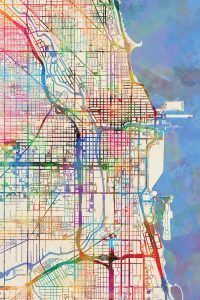by Carol A Westbrook

“Drive east 6 blocks and then turn right, and you’ll be there,” I told my son.
He answered, “Forget it. I don’t know which way is east. I’ll just use my GPS.”
I was incredulous. How could any native Chicagoan not know where east is located–toward Lake Michigan, of course! How could he not be able to find his way without GPS directions? After all, Chicago is merely a grid, as you can see on the map below. The streets are straight lines, oriented north-south and east-west, with 8 blocks to a mile. The street numbers increase by 100 every block, with the zero-zero point being downtown, at State and Madison. Give me the coordinates and I can locate you precisely and find my way there using the map in my head (except for those baffling diagonal streets). And if you prefer to use a compass, rest easy, because the compass declination in Chicago is close to zero
I shouldn’t be surprised that my son, like most younger adults, prefers his GPS. A recent survey showed that four out of five 18 to 30-year olds can’t navigate without electronic guidance, whereas more than half of people over 60 were very comfortable with maps. Myself, I prefer a map. If find my GPS is distracting when I’m driving, and if I follow it blindly I lose my place on my mental map.
Yes, I carry a map of Chicago in my head, or any other place I’m staying for more than a few days–including a hotel room. (It’s a handy way to get to the bathroom in the dark.) Most people have mental maps of their immediate vicinity and the areas where they normally travel; how they use those maps is another story. Read more »
